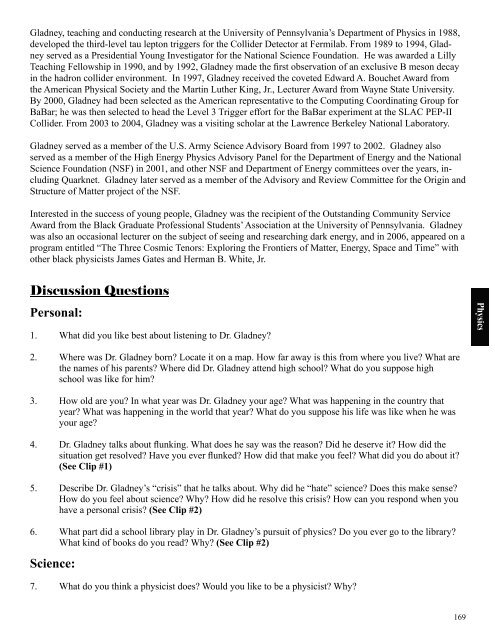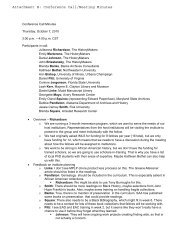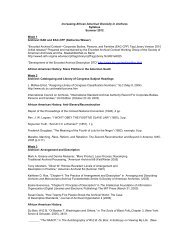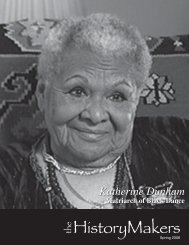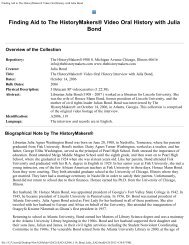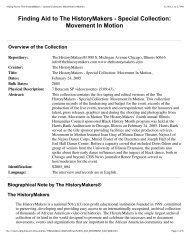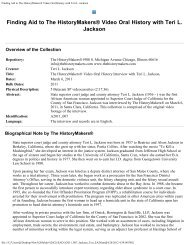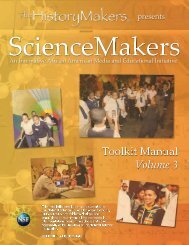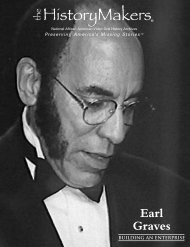ScienceMakers Toolkit Manual - The History Makers
ScienceMakers Toolkit Manual - The History Makers
ScienceMakers Toolkit Manual - The History Makers
Create successful ePaper yourself
Turn your PDF publications into a flip-book with our unique Google optimized e-Paper software.
Gladney, teaching and conducting research at the University of Pennsylvania’s Department of Physics in 1988,<br />
developed the third-level tau lepton triggers for the Collider Detector at Fermilab. From 1989 to 1994, Gladney<br />
served as a Presidential Young Investigator for the National Science Foundation. He was awarded a Lilly<br />
Teaching Fellowship in 1990, and by 1992, Gladney made the fi rst observation of an exclusive B meson decay<br />
in the hadron collider environment. In 1997, Gladney received the coveted Edward A. Bouchet Award from<br />
the American Physical Society and the Martin Luther King, Jr., Lecturer Award from Wayne State University.<br />
By 2000, Gladney had been selected as the American representative to the Computing Coordinating Group for<br />
BaBar; he was then selected to head the Level 3 Trigger effort for the BaBar experiment at the SLAC PEP-II<br />
Collider. From 2003 to 2004, Gladney was a visiting scholar at the Lawrence Berkeley National Laboratory.<br />
Gladney served as a member of the U.S. Army Science Advisory Board from 1997 to 2002. Gladney also<br />
served as a member of the High Energy Physics Advisory Panel for the Department of Energy and the National<br />
Science Foundation (NSF) in 2001, and other NSF and Department of Energy committees over the years, including<br />
Quarknet. Gladney later served as a member of the Advisory and Review Committee for the Origin and<br />
Structure of Matter project of the NSF.<br />
Interested in the success of young people, Gladney was the recipient of the Outstanding Community Service<br />
Award from the Black Graduate Professional Students’ Association at the University of Pennsylvania. Gladney<br />
was also an occasional lecturer on the subject of seeing and researching dark energy, and in 2006, appeared on a<br />
program entitled “<strong>The</strong> Three Cosmic Tenors: Exploring the Frontiers of Matter, Energy, Space and Time” with<br />
other black physicists James Gates and Herman B. White, Jr.<br />
Discussion Questions<br />
Personal:<br />
1. What did you like best about listening to Dr. Gladney?<br />
2. Where was Dr. Gladney born? Locate it on a map. How far away is this from where you live? What are<br />
the names of his parents? Where did Dr. Gladney attend high school? What do you suppose high<br />
school was like for him?<br />
3. How old are you? In what year was Dr. Gladney your age? What was happening in the country that<br />
year? What was happening in the world that year? What do you suppose his life was like when he was<br />
your age?<br />
4. Dr. Gladney talks about fl unking. What does he say was the reason? Did he deserve it? How did the<br />
situation get resolved? Have you ever fl unked? How did that make you feel? What did you do about it?<br />
(See Clip #1)<br />
5. Describe Dr. Gladney’s “crisis” that he talks about. Why did he “hate” science? Does this make sense?<br />
How do you feel about science? Why? How did he resolve this crisis? How can you respond when you<br />
have a personal crisis? (See Clip #2)<br />
6. What part did a school library play in Dr. Gladney’s pursuit of physics? Do you ever go to the library?<br />
What kind of books do you read? Why? (See Clip #2)<br />
Science:<br />
7. What do you think a physicist does? Would you like to be a physicist? Why?<br />
169<br />
Physics


